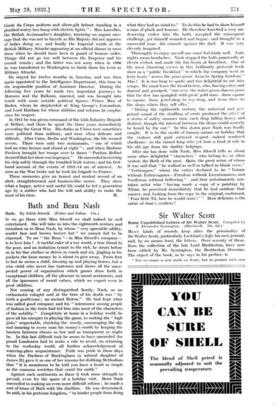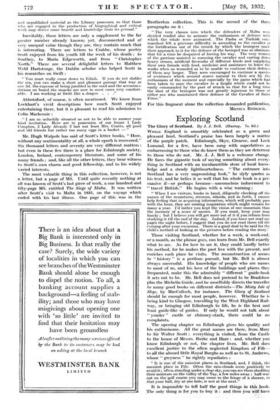Sir Walter Scott
Some Unpublished Letters of Sir Walter Scott. Compiled by J. Alexander Symington. (Blackwell. 10s. 6d.)
MANY kinds of records keep alive the personality of Sir Walter Scott, particularly Lockhart's Life, his own journal, and, by no means least, the letters. Over seventy of these, from the collection of the late Lord Brotherton, have now been edited by Mr. Symington, the Brotherton librarian. The object of the book, as lie says in his preface, is "'_dot to create a new work on Scott, but to present stub new and unpublished material as the Library possesses. so that those who are engaged in the production of biographical and critical -stork may derive some benefit and knowledge from its perusal."
Inevitably, these letters are only a supplement to the far greater number already known; yet, disconnected and of very unequal value though they are, they contain much that is interesting. There are letters to Crabbe, whose poetry Scott enjoyed from his youth till the week of his death ; to Southey, to Maria Edgeworth, and from " Christopher North." There are several delightful letters to Matthew Weld Hartstonge, the Dublin scholar who helped Scott in his researches on Swift :
" You must really come down to Edinh. If you do not dislike the sea, you can make a short and pleasant passage that way at one 3d. the expense of being jumbled in the mail and the accommo- dations on board the smacks are now in most cases very comfort. able. I am working at Swift like a dragon . . ."
Abbotsford, of course, is often mentioned. We know from Lockhart's vivid descriptions how much Scott enjoyed entertaining there, but it is pleasant to read his admission to
Colin Mackenzie : " I am so unluckily situated as not to be able to answer your kind invitation. Here are in possession of our house 1 Lady Compton, 2 Lady Alvanly 3 last not least Mrs. Coutts, all good and old friends but rather too many eggs in a basket — "
Mr. Hugh Walpole has said of Scott's letter books, " Here, without any sentimentality at all, a whole epoch is recovered." Six thousand letters and seventy are very different matters : but even in these few there is a place for Edinburgh society, London, Ireland, contemporary literature, and some of his many friends ; and, like all the other letters, they bear witness to Scott's own charm and good fellowship, and to his widely varied interests.
The most valuable thing in this collection, however, is not a letter, but a page of MS. Until quite recently nothing at all was known of Scott's last piece of work, a one hundred and fifty-page MS. entitled The Siege of Malta. It was written after Scott's visit to Malta in 1831, on the voyage which ended with his last illness. One page of this was in the Brotherton collection. This is the second of the three paragraphs on it :
" The very classes into which the defenders of Malta were divided tended also to animate the enthusiasm of defence with which the whole were animated. The Pasha or Turkish con, mandant felt a grievous difficulty in ascending to the cavalier of the fortification out of the trench by which the besiegers made their approach to it for the defence of the besieged was so obstinate that for a time he despaired of forcing his way. The very women of the garrison assisted in manning the cavalier and casting down heavy atones, artificial fireworks of different kinds and supplying their own friends with food, medicine and assistance to leave the works when so wounded as to be unable to continue their- defence of them any longer. They were encouraged to continue a species of resistance which seemed scarce natural to their sex by the enthusiasm of the moment and especially by the pains which had been taken to raise the cavalier to a height which could not be easily commanded by the post of attack so that for a long time the shot of the besiegers was not greatly injurious to those of either sex who maintained their defence of the Cavalier of Said Erme."
For this fragment alone the collection demanded publication.
MONICA. REDLICH.









































 Previous page
Previous page